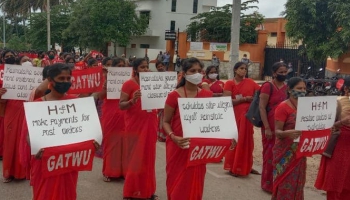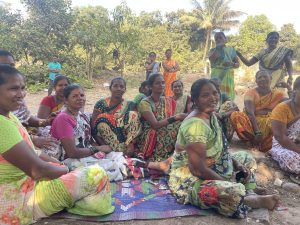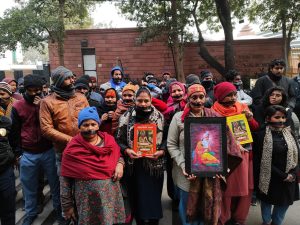How Women Garment Workers Took On A Global Clothing Giant And Won Their Rights

On 24 October, 2020, 1300 women garment workers of Euro Clothing Company– 2 (ECC-2) of a unit of Gokaldas Exports in Srirangapatna, in Mandya district of Karnataka won a major victory for women’s labour rights.
The women workers of the factory who had been laid off in the middle of the pandemic in June last year, were finally paid their dues of nearly 45 lakh rupees by the company. The factory which supplies nearly 60% of cotton clothing to 25 billion dollar global apparel giant H&M, violated the Industrial Disputes Act 1947, Gratituary Bonus Act as well as the Ministry of Home Affairs order of 29 March 2020, which stipulated companies to pay full wages to their employees during the period of the lockdown. Despite being a signatory to the IndustriALL global trade agreement for “responsible purchasing practices”, H&M also refused to take any accountability on the violation of labour rights.
It took two months of sustained protests- one of the longest protests by garment workers in recent times, and written complaints to the labour department in Karnataka for the workers to get Gokuldas exports to pay their pending wages and benefits.
The Karnataka Garment Mahila Karmikara Munnade or Karnataka Garment and Textile Workers Union (GATWU) had been instrumental in mobilising the garment workers to demand their rights.
“In this case, the workers have received their rightful compensation because of the intervention of the union and the awareness about the rights of the workers” said R.Pratibha, the president of GATWU, underscoring the need for greater unionisation in factories.
Violation of Women Workers Rights
Even before the illegal layoff in June, women workers in the Gokuldas factory received their last full salary in March 2020. A report by the Garments Mahila Karmikara Munnade and the Alternative Law Forum reveals that only 61% of garment workers received their wages for the month of March. In the following month, 63 % of the garment workers received no salary and 17% only received only half of their wages.
“The loss in earnings has increased the food insecurity of women garment workers in the region for whom this is the only source of income”, said Pratibha in an interview with BehanBox.
Globally, the garment industry and its workforce were hit hard by the pandemic induced lockdowns. A study by Pennsylvania State University’s Center for Global Workers Rights found that one million garment workers were laid off in Bangladesh- 72% of them without any form of severance pay. A report by the Workers Right Consortium found that nearly 38% of garment workers were terminated without any payment and 68% of garment workers had reported a substantial loss in their income.
A vast majority of garment workers in the factory of Gokuldas Exports belong to Mandya district of South Karnataka, where agriculture and MGNREGA are the only forms of livelihood. Women earn around 100-145 rupees per day working as agricultural labourers. Factories offer a better livelihood option in comparison where women are able to earn 8,000 every month and benefits such as gratuity bonus. They are also entitled to receive a one month notice in the event of factory closures.
On 30 May 2020, the factory owners instead of officially announcing the closure of the factory, intimidated and forced the women to resign, to avoid paying the retrenchment benefits. The management had begun to shift the machinery from the premises indicating a shut down of the factory in violation of the Industrial Disputes Act, 1947 which requires factory owners to provide some notice to the labour force before shut down.
“They would spread rumours about the fact that court settlements would fail and coerced women into resigning. Once they resigned, they did not have to give any compensation”, said Pratibha. This was termed as “a voluntary resignation” by the management.
The company management intimidated women by sending threatening messages to their husbands and forcing auto rickshaw drivers to stop providing transport to women.
Protest In The Pandemic
On June 6th 2020, Gokuldas exports announced that it was laying off 1400 women workers. The GATWU mobilised women workers to protest against the violation of their labour rights.
“A majority of the women protesting had worked with Gokaldas exports for over 10 years. Many of these women were also members of local microfinance institutions in the area. These factories were an important mechanism for them to pay back the loans they had taken.” said Pratibha.
Everyday, from 9 Am to 5 PM, women garment workers sat in a protest for over 2 months.
The sustained protest by the garment workers union caught the attention of Ravi Srikantaiah, the MLA from Srirangapatna and the state Labour Minister Shivram Hebbar who prompted the labour commissioner to convert the complaint into an industrial dispute and serve a notice to Gokaldas Exports.
“Normally, such a conversion of a complaint to an industrial dispute takes over 10 days. But in this case, it was completed within a few hours”, Pratibha told BehanBox.
During the course of the pandemic, over 40 factories were closed in the Mandya region. However, the Euro Clothing Company factory is the only factory where the garment workers were paid their dues.
“This is where the unions’ role becomes very important”, says Pratibha. She added that the factory was targeted for closure due to the presence of the strong union.
A mere 1% of the garment workforce is unionised with several challenges that unions like GATWU face in organising women in the garment industry.
“All these women are first generation workers who came from fields to factories. They don’t have any experience with the process of unionising”, said Pratibha.
The work pressures and heavy production targets also do not allow women to socialise, let alone organise themselves. The male supervisor or manager keeps a very tight surveillance on the women workers. The management of factories sow fear in the minds of workers about the threats to their jobs if they unionise.
“The GokulDas management wanted to intimidate our workers to resign and slowly close the factory. However our workers stood firm. This is all in a time when factories are shutting down and workers across the country are being denied their most basic rights”, she added.
#Garmentworkers #WomensRights #LabourRights #SustainableFashion #EthicalFashion #CleanClothesCampaign
We believe everyone deserves equal access to accurate news. Support from our readers enables us to keep our journalism open and free for everyone, all over the world.




